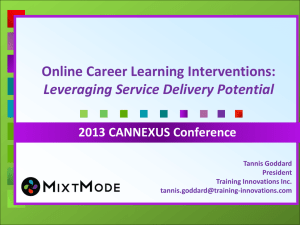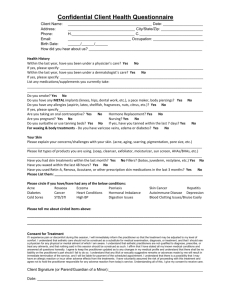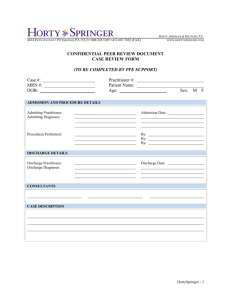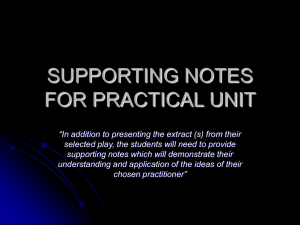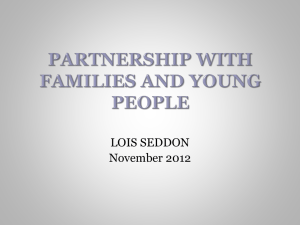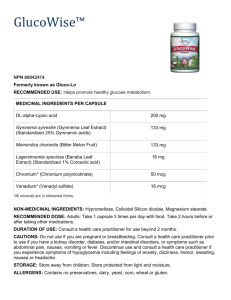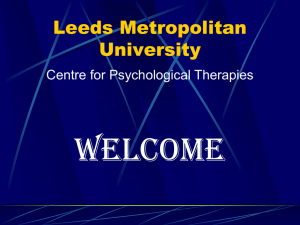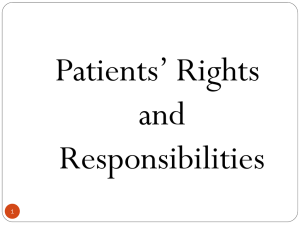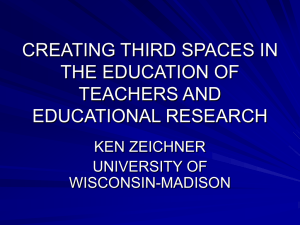PowerPoint - Training Innovations
advertisement
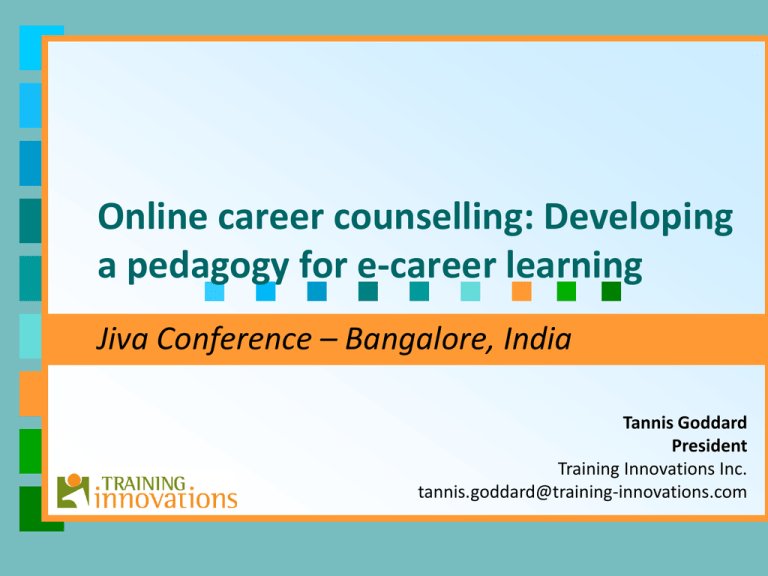
Online career counselling: Developing a pedagogy for e-career learning Jiva Conference – Bangalore, India Tannis Goddard President Training Innovations Inc. tannis.goddard@training-innovations.com Objectives Identify the distinction between online resources and service Consider how e-learning constructivist pedagogy can guide the design and development of online counselling services Explore the impact of locating narratives in an online space related to the roles of “giving” and “getting” online Identify changing roles for practitioners in an online service model Who Gives & Who Gets…Online Resource Services Understanding an individuals’ resource needs Providing resource recommendations Orienting individuals to the materials Following up to verify the value of the resources Practitioning exchange – a purposeful focused intervention to enhance an individual’s career development skills – building from a constructivist, meaning making perspective Vuorinen & Sampson 2009 Relocating the use of ICT from a geographical solution to a solution of learning and engagement Career Learning Career development learning in its broadest form relates to learning about the content and process of career development or life/career management. The content of career development learning in essence represents learning about self and learning about the world of work. Process learning represents the development of the skills necessary to navigate a successful and satisfying life/career . McMahon, Patton & Tatham, 2003, p.6 Career Learning Career-learning thinking is an account of how people learnt to manage working life. It speaks for what they find, what they think-andfeel about that, the sense they make of it and the bases they find for acting on it. Law, 2010, p.2 Online Career Counselling Learning & counselling that takes place using an electronic web-space, where the helping relationship occurs through the use of synchronous and a-synchronous communication methods. Individuals have control in accessing and completing their development process while also engaging in an interactive process with their career facilitator to create meaning and understanding. Online Career Counselling A Collaborative + Self Directed Process Building an e-pedagogy for career learning Information :: Explore relevant career concepts Personal Application :: Engage in activities to apply concepts to self Interaction :: Communicate with e-counsellor and, potentially, other online participants to collaboratively explore meaning Features INFORMATION Content Slides, PDFs, Graphics Resource links to external websites Document Storage Audio or Video Files PERSONAL APPLICATION Reflection Exchanges Dynamic Activities INTERACTION Private Messaging (My Comm) Live Chat Standardized and Informal Assessments Counselling Exchanges Group Discussion Group Discussion Journaling Scoping Program Models Self-Directed Light Facilitation In-depth facilitation Client can self-select content and activities to complete. Pre-assessment can determine the most applicable content and activities for the client. Practitioner can assess content and activity needs throughout client participation. Themed Bite-Sized Content Content and activities are organized and made available by theme or objective. Dialogue between practitioner and client is most likely to occur before or after client engages with content and activities. Practitioner can serve as a thread to support the meaning making of a series of bite-sized modules. Comprehensive Content Content and activities can aim to serve as a source of facilitation through the career learning process. Practitioner can support meaning making as client navigates through content and activities. Dialogue with practitioner and/or other clients is a key component in a client’s experience. Personalized Content All possibilities can: be blended with F2F or V2V (phone) learning experiences include client-to-client interaction support long term or short term access Locating the narrative online Space for client’s narrative to live in his/her language intermixed with practitioner dialogue Transparent and recursive process “draws on imagination and creativity to enable people to become much more knowledgeable about themselves and to increase their sense of agency” (Wright, 2002) Practitioner Impact Expanding role - including design of interventions Adopting a constructivist philosophy – shifting role from expert to facilitator of meaning-making Reconceiving how to build rapport and establish on-going relationships with clients Developing strong reading-for-meaning skills and empathetic writing skills Maintaining strong technical skills
